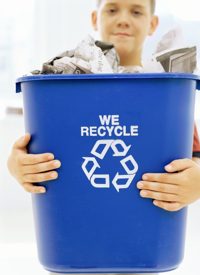
Its latest study, “More Jobs, Less Pollution,” prepared for several interested parties including the BlueGreen Alliance, the Teamsters, and the SEIU, purports to provide
strong evidence that an enhanced national recycling and composting strategy in the United States can significantly and sustainably [there’s that word again] address critical national priorities including climate change, lasting job creation, and improved health.
The term “sustainable development” was first used by the Brundtland Commission, which was convened by the United Nations in 1983 to address the issue of “the accelerating deterioration of the human environment” and to “consider ways and means by which the international community can deal more effectively with [those] environmental concerns.” There is a real threat here, but it is not from too little recycling. The real threat is the loss of freedom brought on by “sustainable development,” which is discussed by noted freedom advocate Tom DeWeese here. The Tellus report confirms that danger to freedom through its need for mandates (force and coercion) to “address” those “critical national priorities.”
First, the report laments the fact that only about 30 percent of waste is currently being recycled while the rest is being shipped to landfills and incinerators. And then it says that through implementing a “bold national recycling and composting strategy,” recycling rates can be boosted to 75 percent, with two major perceived benefits: First, employment in the “waste sector” — to be renamed the “materials management sector” — would increase by 1 ½ million jobs by the year 2030. This would include increased employment in recycling industries, recycling-reliant industries, and reuse and remanufacturing industries, which would, according to Tellus, approach 2 ½ million jobs, up from the current employment level of 860,000.
Second, such forced implementation would allegedly reduce carbon dioxide emissions by 277 million metric tons, “equivalent to shutting down about 72 coal-fired power plants or taking 50 million cars off the road.”
Nothing was said in the report about how the private market is already handling the vast amounts of waste produced in America. Nor was anything mentioned about the actual hard dollar costs involved in such recycling. Leonard Reed, writing in The Freeman in March 1995, notes,
Many people believe that simply segregating plastic containers, glass bottles, newspapers, and metal cans and then placing them in colorful boxes at curbside means that recycling has somehow taken place. Without ever questioning either the cost or the outcome of the process that starts at the curb, they assume that whatever happens must be both economically and environmentally sound….
Recycling programs may make a lot of civic-minded citizens feel good, but the whole rationale is undermined to the extent they are nothing more than expensive, politically-motivated and circuitous methods of old-fashioned garbage disposal.
Where the free market determines value in trash, it creates incentives to retrieve and recycle it. It takes less energy to recycle aluminum cans, for instance, than to convert bauxite to aluminum, and so a market has developed for those cans. Waste Management is turning 60 of their waste sites into energy facilities by capturing the methane gas generated from decomposing landfill waste and turning it into enough electricity to power 700,000 homes. And private scrap yards have successfully and profitably been recycling iron and steel for years.
But most attempts to recycle cost more than the anticipated benefits. A study by the Solid Waste Association of North America showed that curbside recycling programs, composting operations, and waste-into-energy incinerators actually increased the cost of waste disposal, often higher than the costs associated with manufacturing raw materials from virgin sources and then dumping them, after use, into landfills. Notes Floy Lilley, an adjunct faculty member at the Mises Institute,
Recycled newspapers must be de-inked, often with chemicals, creating sludge. Even if the sludge is harmless, it too must be disposed of. Second, recycling more newspapers will not necessarily preserve trees, because many trees are grown specifically to be made into paper. The amount of new growth that occurs each year in forests exceeds by a factor of twenty the amount of wood and paper that is consumed by the world each year.
Glass is made from silica dioxide, the most abundant mineral on the planet — common beach sand — while plastic is derived from petroleum byproducts, making recycling of these products more expensive than making them initially.
There is the cost of collecting recycled waste. Aside from the time and energy citizens use to do their own sorting, there is the increased pollution apparent especially in curbside collection. In Los Angeles, the fleet of trucks is estimated to be twice as large is it otherwise would be, which naturally means more iron ore and coal mining, more steel and more rubber manufacturing, more petroleum refined for fuel, and additional air pollution.
The biggest cost involved in trying to make the planet green is the cost to human freedom when government issues its mandates. As Tellus reminds us, this must involve “a bold national recycling and composting strategy,” in line with other initiatives to make the global concentration camp clean and green.



